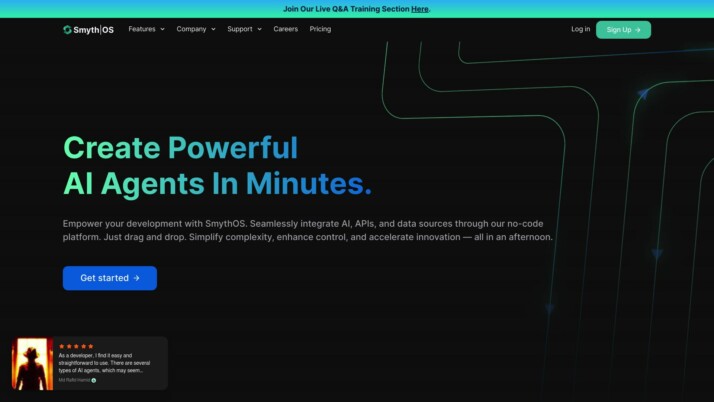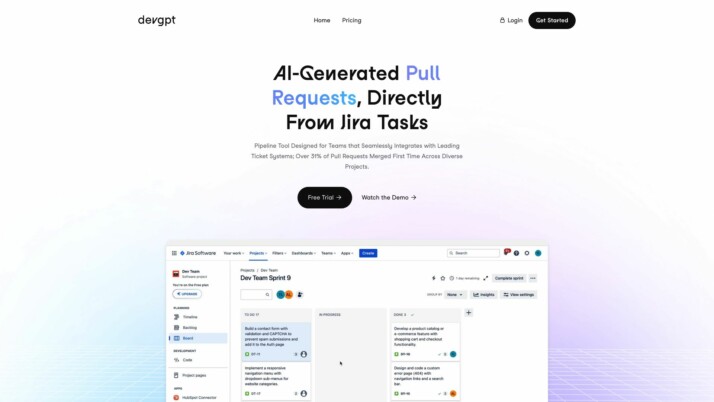SmythOS vs. DevGPT: Comprehensive AI Platform Comparison
In today’s fast-paced, ever-changing world of artificial intelligence (AI), the demand for robust and accessible tools to harness its capabilities is at an all-time high. As organizations across diverse industries strive to unlock the full potential of AI, they seek solutions that offer unparalleled flexibility, scalability, and ease of use.
Whether you are a developer, a business leader, or an AI enthusiast, this comparison review aims to provide a comprehensive analysis of two leading AI platforms: SmythOS vs. DevGPT. By examining their unique features, strengths, and potential use cases, we aim to empower you to make informed decisions and optimize your journey toward AI-driven innovation.
SmythOS Overview
SmythOS is a groundbreaking platform designed to revolutionize the creation and deployment of AI agents. Its unique visual builder interface allows users to effortlessly design complex AI workflows by simply dragging and dropping components. With SmythOS, advanced AI capabilities become accessible to everyone, regardless of their technical expertise.
One of the standout features of SmythOS is its vast integration ecosystem. It seamlessly connects with a wide range of APIs, AI models from providers like OpenAI and Hugging Face, and popular tools like Slack, Trello, and GitHub. This flexibility ensures that SmythOS can enhance virtually any workflow or business process.


Saving time and effort, SmythOS provides pre-built API integrations and pre-built AI templates for common tasks, allowing users to focus on innovation rather than repetitive setup processes. Moreover, SmythOS supports multi-agent orchestration, enabling teams of AI agents to collaborate seamlessly on complex tasks, enhancing efficiency and scalability.
One of the key advantages of SmythOS is its versatile deployment options.
Agents built on the platform can be deployed across various environments, including Google Vertex, Microsoft Copilot, AWS Bedrock, and even as ChatGPT plugins or Alexa skills, ensuring seamless integration with existing systems.
We at SmythOS have shipped a comprehensive AI operating system that empowers users to create, deploy, and manage AI agents with unparalleled ease and speed. Our vision is to revolutionize the way businesses and individuals utilize AI, enabling them to automate mundane tasks, improve efficiency, and drive innovation across various industries.
DevGPT Overview
DevGPT is an open-source AI tool designed to assist software developers by automating coding tasks and generating code from natural language prompts. The key offering allows developers to describe their coding needs in plain English, and DevGPT automatically generates context-relevant code snippets to streamline the development process.
DevGPT leverages advanced language models like GPT-4 and Codex to power its code generation capabilities. The platform integrates with services like GitHub and Jira, enabling developers to generate pull requests directly from tasks or tickets, further enhancing productivity.


One standout feature of DevGPT is its ability to train the AI model on a developer’s own codebase, ensuring the generated code aligns with their team’s coding style and conventions. Additionally, users can provide feedback on the generated code through comments, allowing DevGPT to iteratively improve its outputs.
The core vision of DevGPT is to become an indispensable AI-powered coding companion for developers and software teams of all sizes. By automating repetitive coding tasks, DevGPT aims to save significant development time, with initial users reporting over 10 hours saved per week. The platform is focused on building an engaged community of users and contributors to drive future product development and expand its accessibility beyond individual developers to companies of all sizes.
Feature Comparison
SmythOS is a full-featured AI operating system designed to streamline the creation, deployment, and management of AI agents. With its intuitive drag-and-drop interface, extensive integration ecosystem, and versatile deployment options, SmythOS offers unparalleled flexibility and accessibility for AI development.
In contrast, DevGPT is a more specialized tool focused on assisting software developers by generating code snippets from natural language prompts. While DevGPT leverages advanced language models like GPT-4 and Codex, it lacks many of the comprehensive features that SmythOS provides.
SmythOS supports the creation of autonomous agents capable of performing complex tasks, collaborating with human users, and working together in multi-agent environments.
These agents can be deployed across various platforms, including Google Vertex, Microsoft Copilot, AWS Bedrock, and even as ChatGPT plugins or Alexa skills. DevGPT, on the other hand, primarily generates code but does not offer the same level of agent autonomy or versatile deployment options.
Another key advantage of SmythOS is its robust data management capabilities. The platform supports hosted vector databases, web crawlers, and integrations with various data formats like PDFs, Word documents, and text files. This comprehensive data handling allows SmythOS agents to leverage diverse information sources, enabling more sophisticated and data-driven AI solutions. DevGPT’s data handling capabilities are limited, primarily focused on processing code snippets and related documentation.
Moreover, SmythOS emphasizes security and transparency, offering features like constrained alignment, data encryption, and audit logs for ensuring ethical and responsible AI development. DevGPT does not provide comparable security and transparency measures, which can be crucial for enterprise-level deployments or applications involving sensitive data.
Feature Comparison Table
| SmythOS | DevGPT | |
|---|---|---|
| CORE FEATURES | ||
| Hosted Agents (Dev/Production) | ✅ | ❌ |
| Environments (Dev/Production) | ✅ | ❌ |
| Autonomous Agents | ✅ | ❌ |
| Explainability & Transparency | ✅ | ❌ |
| Multimodal | ✅ | ❌ |
| Multi-Agent Collaboration | ✅ | ❌ |
| SECURITY | ||
| Data Encryption | ✅ | ❌ |
| Constrained Alignment | ✅ | ✅ |
| OAuth | ✅ | ❌ |
| COMPONENTS | ||
| Foundation AIs | ✅ | ❌ |
| Logic | ✅ | ❌ |
| DEPLOYMENT OPTIONS | ||
| Deploy as API | ✅ | ❌ |
| Deploy as Webhook | ✅ | ❌ |
| Scalability | ✅ | ❌ |
| Production Domains | ✅ | ❌ |
| DATA LAKE SUPPORT | ||
| Hosted Vector Database | ✅ | ❌ |
| PDF Support | ✅ | ❌ |
Conclusion
In the rapidly evolving landscape of AI, SmythOS stands out as a comprehensive and game-changing platform revolutionizing the way we create, deploy, and manage AI agents. With its intuitive drag-and-drop interface, extensive integration ecosystem, and versatile deployment options, SmythOS empowers businesses and individuals to harness the full potential of AI like never before.
While tools like DevGPT offer specialized capabilities for code generation, SmythOS takes a holistic approach, providing a robust AI operating system that streamlines the entire agent development lifecycle.
From autonomous agents capable of tackling complex tasks to multi-agent collaboration and seamless human-AI interaction, SmythOS delivers advanced functionalities that transcend traditional boundaries.
To experience the future of AI development firsthand, we invite you to explore our pricing plans and unlock a world of possibilities. Get started with our free tier, or upgrade to unlock enterprise-grade features tailored to your specific needs. Our comprehensive documentation and extensive library of AI templates ensure a seamless onboarding experience, empowering you to create and deploy cutting-edge AI solutions effortlessly.
Join the SmythOS revolution today and witness how our platform can transform your workflows, drive innovation, and propel your business to new heights in the age of AI. Create your free Smyth account now – the future of intelligent automation starts here.
Last updated:
Disclaimer: The information presented in this article is for general informational purposes only and is provided as is. While we strive to keep the content up-to-date and accurate, we make no representations or warranties of any kind, express or implied, about the completeness, accuracy, reliability, suitability, or availability of the information contained in this article.
Any reliance you place on such information is strictly at your own risk. We reserve the right to make additions, deletions, or modifications to the contents of this article at any time without prior notice.
In no event will we be liable for any loss or damage including without limitation, indirect or consequential loss or damage, or any loss or damage whatsoever arising from loss of data, profits, or any other loss not specified herein arising out of, or in connection with, the use of this article.
Despite our best efforts, this article may contain oversights, errors, or omissions. If you notice any inaccuracies or have concerns about the content, please report them through our content feedback form. Your input helps us maintain the quality and reliability of our information.
